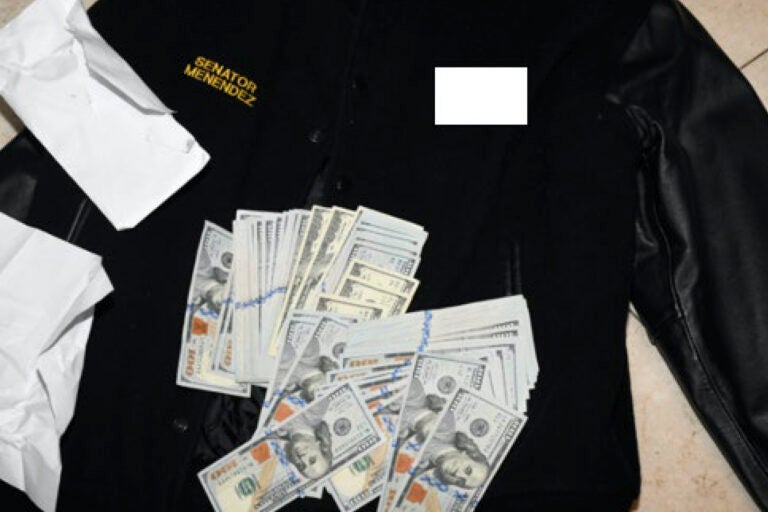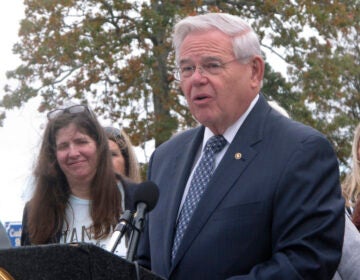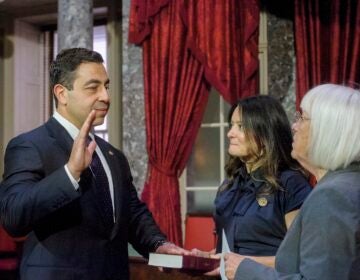Bribery case against Sen. Menendez shines light on powerful N.J. developer accused of corruption
The indictment says Menendez pestered the U.S. attorney for New Jersey and another top federal prosecutor about a bank fraud case involving his friend, developer Fred Daibes.

This photo, which was included in an indictment of U.S. Sen. Bob Menendez (D-N.J.), shows a jacket bearing Menendez's name, along with cash from envelops found inside the Jacket during a search by federal agents of the senator's home in Harrison, N.J., in 2022. (U.S. Attorney's Office via AP)
What you need to know
- U.S. Sen. Bob Menendez and his wife are accused of using his foreign affairs influence to help Egypt in return for bribes.
- Investigators say a search of Menendez’s home yielded nearly $500,000 in hidden cash and $100,000 in gold bars.
- The indictment is the second in eight years against Menendez. His unrelated 2015 indictment ended in a mistrial.
- Gov. Phil Murphy has called the the senior senator’s resignation.
- Here are some key takeaways from Friday’s indictment.
In late 2020, Sen. Bob Menendez met with Philip Sellinger, a private practice lawyer and former fundraiser for the senator, to assess his potential fit as the next U.S. attorney for the state of New Jersey — and to discuss one case in particular.
If appointed, Sellinger would assume control of one of the largest prosecutor’s offices in the country, a post that comes with the power to bust mob bosses and go after corrupt public officials.
But Menendez, federal prosecutors say, was fixated on a less consequential matter: ensuring the future prosecutor would act sympathetically toward a friend of his facing bank fraud charges, real estate developer Fred Daibes.
Daibes is now a key figure in a sweeping bribery case brought against Menendez, his wife and multiple other associates. It accuses Menendez and his wife of accepting hundreds of thousands of dollars worth of cash, gold bars and a luxury car in exchange for a range of favors, including secretly aiding the government of Egypt on U.S. policy matters and interfering in three criminal investigations, including the one involving Daibes.
The indictment unsealed Friday by the U.S. attorney in Manhattan said Daibes paid bribes, including envelopes stuffed with thousands of dollars in cash and gold bars worth more than $120,000.
Menendez has denied wrongdoing, blaming the prosecution on “forces behind the scenes” who “cannot accept that a first-generation Latino American from humble beginnings could rise to be a U.S. Senator.” An attorney for Daibes, Tim Donohue, said he was confident his client would be “completely exonerated of all charges.”
Daibes and Menendez both rose to prominence as power players in the same stretch of urban communities across the Hudson River from Manhattan, where local politics and real estate have long involved favor-trading.
In his home base of Edgewater, New Jersey, just up the river from Union City, where Menendez was once mayor, Daibes is widely credited with building out a “gold coast” of luxury high rises along the formerly industrial waterfront.
That achievement may have been helped by Daibes’ cozy relationship with a number of Edgewater officials, who turned away rival developers from the community and approved his lucrative deals, according to lawsuits and a recent report by the New Jersey State Commission of Investigation.
That report found Daibes rented a discounted apartment to Edgewater’s mayor and provided several million dollars in revenue to a local councilman’s business, while accruing development rights and reneging on promises to build affordable housing.
It said people who opposed Daibes faced reprisals. Edgewater’s previous mayor, James Delaney, testified that his political support evaporated when he complained about what he believed was a corrupt agreement between local officials and Daibes. He ultimately didn’t run for reelection.
“This report is a cautionary tale concerning the inherent dangers of enabling an influential, politically-connected and unelected private citizen to hold outsized power in government concerns,” the commission wrote.
Delaney’s former wife, Bridget Delaney, who had spent 15 years working for Daibes at his restaurant, said the couple were effectively run out of Edgewater, ruining their lives.
“There’s fraud all over that town,” she told The Associated Press on Friday. “When he’s in jail, maybe that will provide some relief.”
In 2018, Daibes was charged by federal prosecutors in Newark with obtaining loans under false pretenses from a bank that he owned. The charges were serious, carrying the potential for years in prison.
Daibes was still awaiting trial in 2021 when Menendez, as New Jersey’s senior senator, played a key role in advising the new administration of President Joe Biden on potential candidates to be the top federal prosecutor in the state.
According to the indictment, Menendez initially rejected Sellinger as a candidate after their December 2020 job interview because the lawyer told him he would likely have to recuse himself from any case involving Daibes due to a previous matter in which he represented the developer.
But after another candidate fell through, Menendez ultimately recommended him for the job.
After Sellinger was sworn in, the Department of Justice had him step aside from the Daibes prosecution and hand responsibility for it to another senior prosecutor. Menendez, according to the indictment, then badgered both Sellinger and the prosecutor who had been put in charge of Daibes case, calling them several times.
Menendez also asked one of his political advisors to let Sellinger know he was upset with the way the Daibes case was being handled, according to the indictment.
During the months in 2022 when Menendez was trying to influence the handling of the case, Daibes arranged for Menendez’s wife, Nadine, to be given two gold bars, each worth around $60,000, along with an envelope containing thousands of dollars in cash, the indictment said.
At one point, Menendez performed a web search for “how much is one kilo of gold worth?”
David Schertler, a lawyer for Nadine Menendez said she “denies any criminal conduct and will vigorously contest these charges in court.”
Sellinger and his senior prosecutor told investigators they kept Menendez’s attempts to influence the case from the team of lawyers handling the prosecution and took no steps to intervene, the indictment said.
In an emailed statement, a spokesperson for the New Jersey U.S. Attorney’s Office noted the recusal by Sellinger, adding that all activity related to that matter was handled appropriately according to the principles of federal prosecution.
Last year, following a delayed trial, Daibes pleaded guilty in his bank fraud case. Under the agreement, he would receive only probation, according to his attorney. But his sentencing has been repeatedly delayed and is now scheduled to take place next month.
WHYY is your source for fact-based, in-depth journalism and information. As a nonprofit organization, we rely on financial support from readers like you. Please give today.






